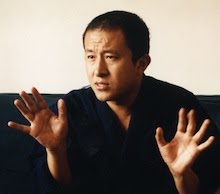- Between the rational and the mystical - What is agnosticism? We neither need an external, creator God, nor to close ourselves off from the spectacular majesty of existence
- Buddhism and the brain - The Mind and Life conference brings together two powerful ways of understanding mind and its place in the world
- A sense of self - Could science abolish personalities along with God?:Personality may be an illusion, but not the kind described by materialists like Colin Blakemore
- Is it always about belief? - The Buddha emphasised that we should not trust the teachings of any faith based on – among other things – scripture, religious authorities, or logical and philosophical reasoning
Wednesday, May 27, 2009
Articles on Buddhism in the Guardian UK
Rahula Chapter 8 - Buddhism in Today's World
Thursday, May 14, 2009
The Erosion of Buddhism in the West
Wednesday, May 13, 2009
Happiness
By any normal measure, they had it made. They tended to be bright, polished, affluent and ambitious. They had the benefit of the world’s most prestigious university. They had been selected even from among Harvard students as the most well adjusted.
Their lives played out in ways that would defy any imagination save Dostoyevsky’s. A third of the men would suffer at least one bout of mental illness. Alcoholism would be a running plague. The most mundane personalities often produced the most solid success. One man couldn’t admit to himself that he was gay until he was in his late 70s.
Buddhism at Google?
The school's ethos could be a blueprint for workplace education, as "Google wants to help Googlers grow as human beings on all levels - emotional, mental, physical and 'beyond the self'."
“If you want executive management support, you better back it up with data,” Broecker said. “We did a lot of research as to the effectiveness of our programs. One of the questions [we researched] was whether we could show that people who had gone through our programs were happier in Google than people who had not gone through our programs. And we definitely had data that showed that this was the case.”
Sunday, May 10, 2009
Rahula Chapter 6 - Anatta: The Doctrine of No-Self (part 3) & Chapter 7 - Bhavana (Meditation)
A recording of today's teachings and discussion (from 10th May) of Rahula's "What the Buddha Taught" (part 3 on Chapter 6 and chapter 7) can be downloaded here. Among the topics we covered today:
- The purpose of meditation and its benefits in cultivating mental health
- Meditation techniques
- The two forms of meditation, shamatha and vipashyana, and their relationship to each other and to the view (including "form is emptiness, emptiness is form")
- Deconstruction and dis-identification from form, feeling, thoughts, references and self - how meditation allows to cultivate egolessness
- Living in the present moment, losing yourself in your action, flow and positive psychology, creativity and performance
Tuesday, May 5, 2009
Is Twitter a path to happiness?
Stumbling Blocks on the Path of Righteousness
In recent years, social psychologists have begun to study what they call the holier-than-thou effect. They have long known that people tend to be overly optimistic about their own abilities and fortunes — to overestimate their standing in class, their discipline, their sincerity.
But this self-inflating bias may be even stronger when it comes to moral judgment, and it can greatly influence how people judge others’ actions, and ultimately their own. Culture, religious belief and experience all help shape a person’s sense of moral standing in relation to others.
Religion appears to amplify the instinct to feel like a moral beacon. The study also found that the most strictly fundamentalist of the students were at the highest end of the scale. "It reminds me of one of my favorite bumper stickers,” said Dr. Epley, of Chicago. “ ‘Jesus loves you, but I’m his favorite.’
Multitasking is a Myth
The psychologist William James wrote: “My experience is what I agree to attend to.” You can lead a miserable life by obsessing on problems. You can drive yourself crazy trying to multitask and answer every e-mail message instantly.“Multitasking is a myth,” Ms. Gallagher (author of "Rapt") said. “You cannot do two things at once. The mechanism of attention is selection: it’s either this or it’s that.” She points to calculations that the typical person’s brain can process 173 billion bits of information over the course of a lifetime. “People don’t understand that attention is a finite resource, like money,” she said. “Do you want to invest your cognitive cash on endless Twittering or Net surfing or couch potatoing? You’re constantly making choices, and your choices determine your experience, just as William James said.”Ms. Gallagher advocates meditation to increase your focus.
.jpg)
.jpg)